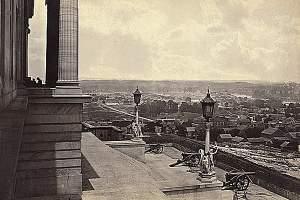Record Data
Source citation
"President Johnson and His Enemies," Daily Union and American (Nashville, TN), March 28, 1866, p.2.
Original source
Richmond Dispatch
Type
Newspaper
Date Certainty
Exact
Transcriber
John Osborne, Dickinson College
Transcription date
Transcription
The following text is presented here in complete form, as it originally appeared in print. Spelling and typographical errors have been preserved as in the original.
PRESIDENT JOHNSON AND HIS ENEMIES
The National Intelligencer declares that even among men of high official station, there exists a project for putting the President out of the way by impeachment. Section 4, article 2, of the Constitution, provides that the "President, Vice-President, and all civil officers of the United States, shall be removed from office on impeachment for and conviction of treason, bribery, or other high crimes and misdemeanors." Section 5, article 1, declares that the House of Representatives shall have sole power of impeachment, and section 6, of same article, that the Senate shall have sole power to try all impeachments. When sitting for that purpose, they shall be on oath or affirmation. When the President of the United States is tried, the Chief Justice shall preside; and no person shall be convicted without the concurrence of two-thirds of the members present. Section 7 declares that judgment in case of impeachment shall not extend farther than to removal from office, and disqualification to hold any office under the United States. Section 6, of article 2, provides that in case of the removal of the President from office, or of his death, resignation, or inability to discharge the duties of his office, the same shall devolve on the Vice-President; and that Congress may by law provide for the case removal, death, etc., both of the President and Vice-President declaring what officer shall then act as President and said officer shall act accordingly, until the disability shall be removed, or a President shall be elected.
If the House of Representatives has the nerve, it has unquestionably the power to impeach the President. It must be, however, for treason, bribery, or other high crimes and misdemeanors. Which of these has Andrew Johnson committed? We could scarcely believe, except upon the grave authority of the National Intelligencer, that a single member of the House of Representatives could be found mad enough to allege against the President of the United States any of the crimes which the Constitution specifics as furnishing grounds for impeachment. Unless it is treason, or a high crime and misdemeanor, to veto an act of Congress, and sustain that veto with arguments which the Radicals of that body are unable to answer, we cannot conceive how the enemies of Andrew Johnson can so much as intimate a constitutional process for his trial.
Still less is it possible to understand how they can anticipate the success of an impeachment when two-thirds of the Senate cannot be brought even to overthrow his veto.The President, in his 22d of February speech, intimates that even the desperate and infernal means of assassination has been contemplated by some of his enemies to remove him out of the way. The brutal ferocity of temper exhibited by some of his assailants in the newspaper press, would warrant the conclusion that passions are excited which might lead to such a terrible catastrophe.
What a fearful emphasis does such a state of facts impart to the words of Washington's Farewell Address, when he said; "Let me warn you, in the most solemn manner, against the baneful effectss of the spirit of party generally. This spirit, unfortunately, is inseparable from our nature, having its roots in me strongest passions of the human mind. It exists under different shapes in all governments, but in those of the popular form it is seen in the greatest rankness, and is truly their worst enemy. The alternate domination of one faction over another, sharpened by the spirit of revenge, natural to party dimensions, which, in different ages and countries, has perpetrated the most horrid enormities, is itself a frightful despotism. But this leads, at length, to a more formal and permanent despotism."
There is, indeed, an "earthquake" heaving, not only under the capital, but under the whole temple of Republican Government, if party passion shall not be checked and restrained. - Richmond Dispatch


